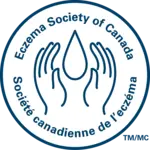Learn more about topical corticosteroids: insights from dermatologist Miriam Weinstein
Topical corticosteroids are a group of medications that are often used in the management of eczema. To explore this topic further, ESC invited Toronto-based paediatric dermatologist Miriam Weinstein, MD, FRCPC to share her expertise on topical corticosteroids and how they are typically used in the treatment of atopic dermatitis, commonly known as eczema. As with all medications, topical corticosteroids pose a risk for side effects and should only be used under the supervision of a qualified health care professional.
What are topical corticosteroids?
Topical corticosteroids are a group of medications used to treat the inflammation (i.e. rash, redness, swelling, pain, and itch) of eczema and are applied directly on the skin. Sometimes these medications are called steroids or cortisones. They work by briefly changing the chemicals in the skin as a way to reduce inflammation. Corticosteroids are also made by the body naturally and help to control many body functions.
Topical corticosteroids have been used to treat eczema for more than 50 years. It is important to keep in mind that all medications hold a risk of side effects, and untreated and under-treated eczema can have a negative impact on different areas of life, such as sleep, mood, social activities, stress, ability to focus, and family life. The use of topical corticosteroids should be discontinued when the skin is healed; however, it is important to allow the skin to heal completely before stopping use. Be sure to discuss any questions or concerns you may have regarding your treatment with a qualified health care professional.
Why do flares keep coming back?
Eczema is a chronic condition, meaning it may clear up for periods of time after treatment, but then flares up again. At this time, there is no cure for eczema so we focus on moisturizing the skin, avoiding triggers when and where possible, and treating flares at the first sign of inflammation (e.g. rash, redness, or itch), and until the skin is healed completely. Be sure to speak with a qualified health care professional, such as a dermatologist, if you have any questions related to your/your child’s treatment plan.
Eczema Society of Canada thanks Miriam Weinstein, MD, FRCPC for her volunteer contribution to this educational content.
Disclaimer: Information provided in this resource does not constitute medical advice and is not intended to be used as a diagnostic tool. The information is up-to-date at time of publication. All medications, interventions, and treatment plans have risks and benefits, and it is important that individuals discuss their or their child’s specific health care needs with a qualified health care professional.
August 2021

